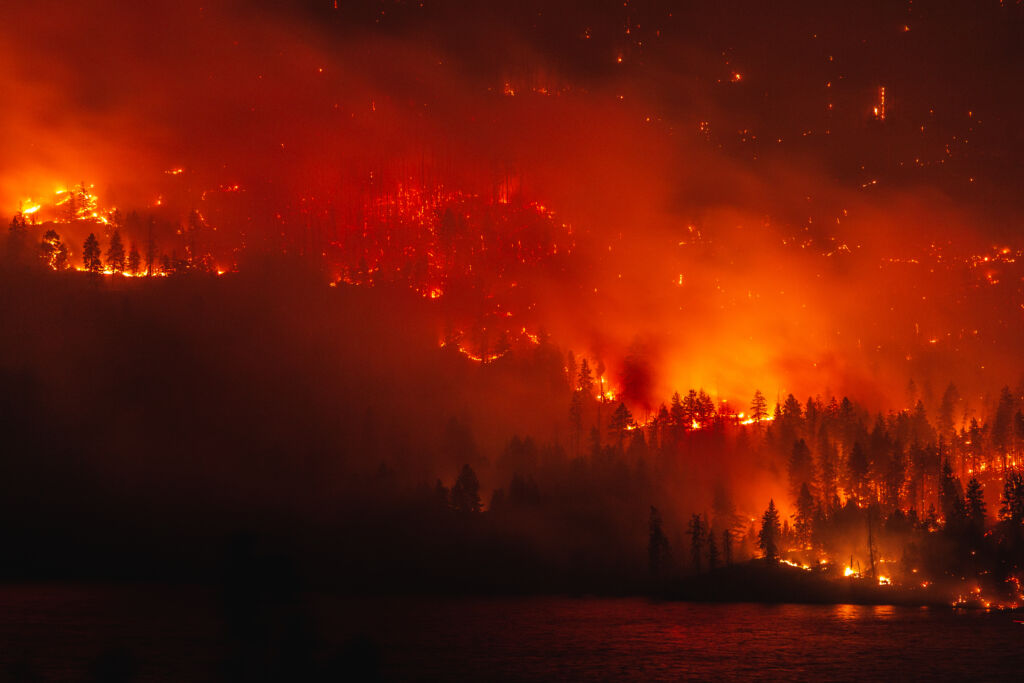The urgency of the global climate crisis could not be more obvious than in India right now, where a 50ºC heatwave is causing “heavy casualties” both directly through heat-related deaths and indirectly through water and food shortages.
Canadians have been spared that kind of heat so far, but it’s little consolation to the Albertan communities being evacuated from their homes due to unseasonable wildfires or the communities in Eastern Canada reeling from the second “hundred-year” flooding in the past three years.
Scientists are unequivocal that these kinds of events are made worse and more likely by a warming planet. Scientists are equally clear that our combustion of fossil fuels—mainly coal, oil and natural gas—is the key driver of these changes. Without dramatic action to reduce greenhouse emissions, these impacts are only going to get worse.
But our understanding of the climate crisis does not stop there. Engineers and economists have explained in great detail how we can reduce our net GHG emissions to zero based on present technologies. It is both technically and economically feasible to meet the Paris Agreement goals.
In other words, we already understand the problem and we already know the solutions. Yet, for all that clarity, and in the face of growing climate-related disasters in communities across the country, many of Canada’s governments and political leaders are moving backwards on climate action.
That’s the main finding of a new CCPA report, Heating Up, Backing Down, co-published with the Adapting Canadian Work and Workplaces to Respond to Climate Change research program, based at York University. The report evaluates the recent climate policy progress of Canada’s federal and provincial governments.
Here are some of the key themes we identified in the Canadian climate policy landscape over the past two years.
Abandoned targets
Several governments have recently abandoned GHG emission reduction targets that they had little hope of meeting, including British Columbia, Manitoba and Ontario. Those targets were generally replaced by less ambitious goals with later deadlines.
Canada’s national targets remain highly insufficient when compared to our fair share under the Paris Agreement. Nevertheless, several provinces, including Prince Edward Island and Newfoundland and Labrador, established new targets pegged to the national goal.
Some provinces continue to refuse to establish emission reduction targets at all. Alberta and Saskatchewan together account for half of Canada’s emissions, but neither has committed to reducing them in absolute terms.
Failure to tackle fossil fuels
Canadian governments have shied away from tackling the root cause of the climate crisis—fossil fuel production—preferring instead to place the burden of emissions reductions on consumers. Demand-side measures like fuel economy standards and carbon pricing are important, but they’re only half the equation.
Supply-side measures to phase out the extraction and processing of coal, oil and natural gas is essential for Canada and the world to meet the Paris Agreement targets, yet many governments are doubling down on fossil fuel production. Among other recent policies, Newfoundland and Labrador committed to doubling oil production by 2030, Alberta promised to expedite new extraction projects, British Columbia announced $6 billion in tax breaks for the natural gas industry, and the federal government invested $4.5 billion in an oil pipeline.
Distraction by carbon pricing
Partisan criticism of carbon pricing in Canada is disingenuous and mostly inaccurate, yet conservative politicians have succeeded in stoking public opposition to this relatively modest climate policy. As a result, several governments across the country have rolled back pre-existing carbon pricing systems while challenging the federal government’s right to impose one.
Carbon pricing is a useful and efficient tool for reducing greenhouse gas emissions, but the political fight over this particular policy is reducing the space for governments to pursue other, potentially more effective climate policies.
Underinvestment in the future
For Canada to do our fair share to mitigate the climate crisis and avoid catastrophic global heating will require systemic changes in how we produce and consume energy. That means a lot of new and retrofitted infrastructure, and that requires a lot of money.
But Canada’s governments are not investing in a zero-carbon economy at anywhere near the necessary levels. Very few provincial climate plans are backed with meaningful budgets, and some budgets, like Ontario’s and Alberta’s, are shrinking due to the repeal of provincial carbon pricing systems.
Even where money is promised—the federal government has allocated roughly $50 billion for low-carbon infrastructure—the funding is often backloaded over a decade or more. Canada needs public investment on another order of magnitude and on a much shorter timeline.
The wrong time to back down
By any measure, there is no greater threat to Canadians’ long-term well-being than a changing climate. As a rich country with a large fossil fuel industry and some of the highest per-capita emissions on the planet, we not only have the capacity to act, but also a clear responsibility to show the world how decarbonization can be done.
Canadian governments need to restore earlier momentum and ramp up their climate ambitions. There is no more time to waste.
Hadrian Mertins-Kirkwood is a researcher on international trade and climate policy for the Canadian Centre for Policy Alternatives. Follow Hadrian on Twitter: @hadrianmk.







